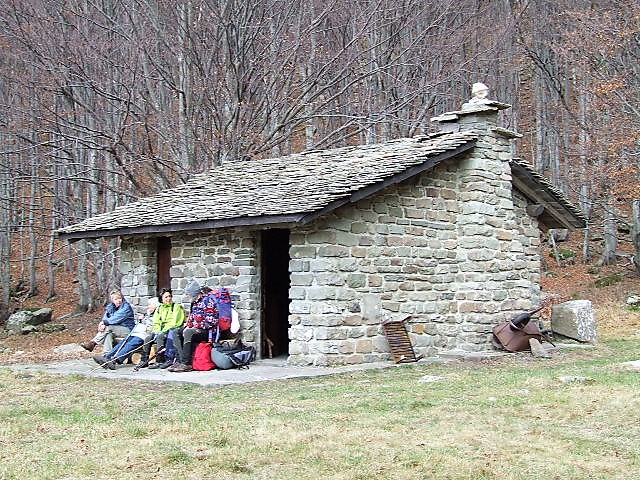
Wild camping is discouraged in Italy and is forbidden in parts of the Tosco-Emiliano National Park. Instead, travellers are expected to use the (admittedly small number) of official campsites or alternatively to make use of the (excellent) Rifugios, Baitas, Bivaccos and Capannas managed by the CAI and others. Rifugios are usually basic hotels similar in some ways to the modern day Youth Hostels found in the UK. In contrast, Baitas, Bivaccos and Capannas are more like Scottish bothies – unmanned and providing very basic accommodation, usually free of charge. Invariably there is no piped water or internal sanitation but there is always a source of fresh drinking water nearby and wood burning stoves, cooking equipment, dining tables/benches and sleeping platforms are provided.
Rifugios are few and far between in the Lunigiana, but there are quite a number of small, unserviced, unmanned mountain huts available for use by walkers throughout the year. These are located mainly on the Eastern side of the valley. Examples include:
- Baita Tifoni
- Baita Matale
- i Porcili
- Rifugio Attilio Loc Fagianelli (CAI Path 122/125. Comune of Bagnone)
- Capanna dei Salarini (CAI Path 110. Comune of Licciana Nardi)
- Bivacco Rosario (CAI Path 00. Monte la Nuda)
A comprehensive list may be found on the CAI Sarzana web site.
When considering a stay at one of the mountain huts you should note the following:
- The sleeping space is usually a flat, timber boarded area under the roof accessed via a ladder. For comfort it’s sensible to take a foam sleeping roll to place under one’s sleeping bag together with an inflatable pillow.
- Electricity, piped water, showers and toilet facilities are not normally provided. (Water is normally obtained from a nearby stream).
- Cooking facilities take the form of a timber fuelled stove. Basic pots and pans are normally provided. The timber store is re-filled annually: there is usually no shortage of fuel.
- Users are expected to clean the huts after use.
- All rubbish should be packed up and taken away, not left behind or buried.
- Users are expected to take their own entrenching tool (ie folding spade) for toileting purposes. (The area around some popular baita’s is littered with toilet paper and faeces – disgusting).
- Any repairs required should be noted in the comments book.
- It is appreciated when users leave any spare food, matches, candles etc behind for the use of subsequent occupiers.
Larger Rifugios
There are two larger rifugios near Pontremoli – both located on the Prati di Logarghena. Rifugio Mattei is run by CAI Pontremoli – normally kept locked, it’s used infrequently for group events but has a “Bivacco Invernale” available for emergencies (open 24-7 but no facilities other than a single bunk bed).
Recently completed, Rifugio Logarghena is owned by the Comune of Filattiera but is not currently (Jan 2025) operational.